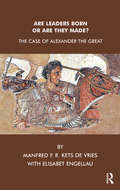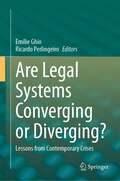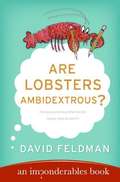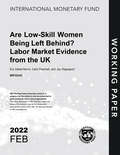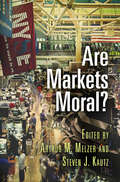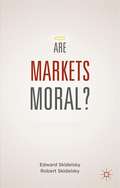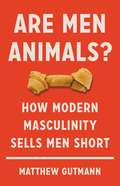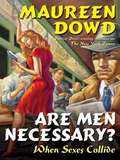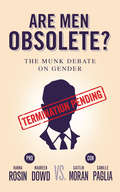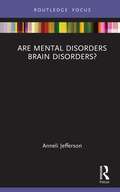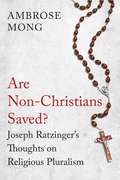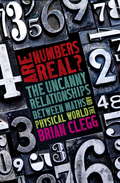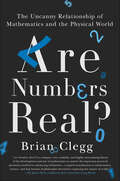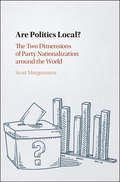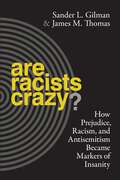- Table View
- List View
Are Laws Needed for Public Management Reforms? An International Comparison
by Ian LienertA report from the International Monetary Fund.
Are Leaders Born or Are They Made?: The Case of Alexander the Great
by Elisabet Engellau Manfred F. Kets de VriesThis book discusses the psychodynamics of leadership-in and relies on concepts of developmental psychology, family systems theory, cognitive theory, dynamic psychiatry, psychotherapy, and psychoanalysis to understand Alexander's behaviour and actions.
Are Legal Systems Converging or Diverging?: Lessons from Contemporary Crises
by Emilie Ghio Ricardo PerlingeiroThis book focuses on two main aspects: legal convergence and crises. Despite the abundance of literature on legal convergence over the years, the question of whether legal systems are converging or diverging remains unanswered. This book provides a valuable contribution to questions concerning comparative law, legal convergence, and legal transplants by examining them through the lens of crises.Crises challenge countries’ legal systems and prompt institutional responses to tackle perceived shortcomings in the law. The crises witnessed by the world over the last two decades have highlighted two seemingly contradictory tendencies:(i) increased cooperation and a natural phenomenon of legal convergence as states find common solutions to common problems;(ii) a preference for state-centric solutions, which prioritise domestic interests; rejection of supranational standards and harmonisation efforts; and protection of domestic sovereignty.This book aims to determine whether, in times of crisis, foreign laws, rules, and concepts can transcend countries’ domestic legal systems, or whether states’ responses to crises lead to legal divergence and disintegration.Unlike traditional studies on convergence, this edited volume takes an international and cross-thematic approach, with chapters focusing on how legislation in selected jurisdictions has responded to crises. Therefore, the book’s originality lies in its truly global nature, with chapters and authors surveying jurisdictions in Africa, North and South America, Asia, Europe and Oceania. The breadth of legal areas covered, with a mix of private and public law, also add to its uniqueness.From Russia to Germany and from bankruptcy law to environmental law, the book examines whether, as a result of crises, policy and legal responses have adopted, copied, or implemented features, policies, principles and/or rules from other legal systems (convergence), or have departed from existing legal norms, adopting policies and rules that differ from those of other countries (divergence).
Are Liberty and Equality Compatible?
by Jan Narveson James P. SterbaAre the political ideals of liberty and equality compatible? This question is of central and continuing importance in political philosophy, moral philosophy, and welfare economics. In this book, two distinguished philosophers take up the debate. Jan Narveson argues that a political ideal of negative liberty is incompatible with any substantive ideal of equality, while James P. Sterba argues that Narveson's own ideal of negative liberty is compatible, and in fact leads to the requirements of a substantive ideal of equality. Of course, they cannot both be right. Thus, the details of their arguments about the political ideal of negative liberty and its requirements will determine which of them is right. Engagingly and accessibly written, their debate will be of value to all who are interested in the central issue of what are the practical requirements of a political ideal of liberty.
Are Lobsters Ambidextrous?
by David FeldmanPonder, if you will ... Has anyone ever seen a live Cornish game hen? Why do quarterbacks say "Hut"? Why do "sea" gulls congregate in parking lots of shopping centers? What does the "Q" in Q-Tips stand for? Pop culture guru David Feldman demystifies these questions and much more in Are Lobsters Ambidextrous? Part of the Imponderables® series-the unchallenged source of answers to civilization's everyday mysteries-and charmingly illustrated by Kassie Schwan, this book provides you with information that encyclopedias, dictionaries, and almanacs just don't have. And think about it, where else are you going to find out what happens to the caffeine left over from making decaffeinated coffee?
Are Low-Skill Women Being Left Behind? Labor Market Evidence from the UK (Imf Working Papers)
by Era Dabla-Norris, Carlo Pizzinelli, and Jay RappaportA report from the International Monetary Fund.
Are Markets Moral?
by Arthur M. Melzer Steven J. KautzDespite the remarkable achievements of free markets—their rapid spread around the world and success at generating economic growth—they tend to elicit anxiety. Creative destruction and destabilizing change provoke feelings of powerlessness in the face of circumstances that portend inevitable catastrophe. Thus, from the beginning, capitalism has been particularly stimulative for the growth of critics and doomsayers. While early analysts such as Karl Marx primarily emphasized an impending economic disaster, in recent years the economic critique of capitalism has receded in favor of moral and environmental concerns.At the heart of this collection of original essays lies the question: does morality demand that we adopt a primarily supportive or critical stance toward capitalism? Some contributors suggest that the foundational principles of the capitalist system may be at odds with the central requirements of morality, while others wonder whether the practical workings of markets slowly erode moral character or hinder the just distribution of goods. Still others consider whether morality itself does not demand the economic freedom constitutive of the capitalist system. The essays in Are Markets Moral? represent a broad array of disciplines, from economics to philosophy to law, and place particular emphasis on the experiences of non-Western countries where the latest chapters in capitalism's history are now being written.Contributors: Andrew S. Bibby, Gurcharan Das, Richard A. Epstein, Fonna Forman, Robert P. George, Steven J. Kautz, Peter Augustine Lawler, Steven Lukes, Deirdre Nansen McCloskey, Peter McNamara, Arthur M. Melzer, John Tomasi.
Are Markets Moral?
by Edward Skidelsky Robert SkidelskyThis volume scrutinizes the functionality of a capitalist market society, which is usually praised for the efficiency and dynamism, rather than for its morality. It addresses the dualism behind capitalism's encouragement of greed, which is usually considered to be a moral failing, while also being a driver behind economic growth.
Are Men Animals?: How Modern Masculinity Sells Men Short
by Matthew Gutmann"Boys will be boys," the saying goes -- but what does that actually mean? A leading anthropologist investigatesWhy do men behave the way they do? Is it their male brains? Surging testosterone? From vulgar locker-room talk to mansplaining to sexual harassment, society is too quick to explain male behavior in terms of biology. In Are Men Animals?, anthropologist Matthew Gutmann argues that predatory male behavior is in no way inevitable. Men behave the way they do because culture permits it, not because biology demands it. To prove this, he embarks on a global investigation of masculinity. Exploring everything from the gender-bending politics of American college campuses to the marriage markets of Shanghai and the women-only subway cars of Mexico City, Gutmann shows just how complicated masculinity can be. The result isn't just a new way to think about manhood. It's a guide to a better life, for all of us.
Are Men Necessary?
by Maureen DowdAre men afraid of smart, successful women? Why did feminism fizzle? Why are so many of today's women freezing their faces and emotions in an orgy of plasticity? Is "having it all" just a cruel hoax? In this witty and wide-ranging book, Maureen Dowd looks at the state of the sexual union, raising bold questions and examining everything from economics and politics to pop culture and the "why?" of the Y chromosome. These new writings will delight her devoted readers - and anyone trying to sort out the chaos that occurs when sexes collide.
Are Men Obsolete?: The Munk Debate on Gender (The Munk Debates)
by Hanna Rosin Maureen Dowd Caitlin Moran Camille PagliaFor the first time in history, will it be better to be a woman than a man in the upcoming century? The twelfth semi-annual Munk Debate pits Hanna Rosin and Maureen Dowd against Caitlin Moran and Camille Paglia to debate one of the biggest socio-economic phenomena of our time — the relative decline of the power and status of men in the workplace, in the family, and society at large.Men have traditionally been the dominant sex. But now, for the first time, a host of indicators suggests that women not only are achieving equality with men, but are fast emerging as the more successful sex of the species. Whether in education, employment, personal health, or child rearing, statistics point to a rise in the status and power of women at home, in the workplace, and in traditional male bastions such as politics. But are men, and the age-old power structures associated with “maleness,” permanently in decline?In this edition of the Munk Debates — Canada’s premier debate series — renowned author and editor Hanna Rosin and Pulitzer Prize–winning columnist Maureen Dowd square off against New York Times–bestselling author Caitlin Moran and academic trailblazer Camille Paglia to debate the future of men.With women increasingly demonstrating their ability to “have it all” while men lag behind, the Munk Debate on gender tackles the essential socio-economic question: Are men obsolete?
Are Mental Disorders Brain Disorders? (Routledge Focus on Philosophy)
by Anneli JeffersonThe question of whether mental disorders are disorders of the brain has led to a long-running and controversial dispute within psychiatry, psychology and philosophy of mind and psychology. While recent work in neuroscience frequently tries to identify underlying brain dysfunction in mental disorders, detractors argue that labelling mental disorders as brain disorders is reductive and can result in harmful social effects. This book brings a much-needed philosophical perspective to bear on this important question. Anneli Jefferson argues that while there is widespread agreement on paradigmatic cases of brain disorder such as brain cancer, Parkinson's or Alzheimer’s dementia, there is far less clarity on what the general, defining characteristics of brain disorders are. She identifies influential notions of brain disorder and shows why these are problematic. On her own, alternative, account, what counts as dysfunctional at the level of the brain frequently depends on what counts as dysfunctional at the psychological level. On this notion of brain disorder, she argues, many of the consequences people often associate with the brain disorder label do not follow. She also explores the important practical question of how to deal with the fact that many people do draw unlicensed inferences about treatment, personal responsibility or etiology from the information that a condition is a brain disorder or involves brain dysfunction.
Are Mexican Business Cycles Asymmetrical?
by André Oliveira SantosA report from the International Monetary Fund.
Are Middle Eastern Current Account Imbalances Excessive?
by Samya Beidas-Strom Paul CashinA report from the International Monetary Fund.
Are Miraculous Gifts for Today?: 4 Views (Counterpoints: Bible and Theology)
by Stanley N. Gundry Wayne A. GrudemAre the gifts of tongues, prophecy, and healing for today? No, say cessationists. Yes, say Pentecostal and Third Wave Christians. Maybe, say a large sector of open-but-cautious evangelicals. What’s the answer? Is there an answer? Are Miraculous Gifts for Today? takes you to the heart of the charismatic controversy. It provides an impartial format for comparing the four main lines of thinking: cessationist, open but cautious, third wave, and Pentecostal/charismatic. The authors present their positions in an interactive setting that allows for critique, clarification, and defense. This thought-provoking book will help Christians on every side of the miraculous gifts debate to better understand their own position and the positions of others. Wayne Grudem has brought online the four major views on miraculous gifts today. Downloading them into your own understanding takes effort, but the worldwide network that you join is the fellowship of the Spirit! The Counterpoints series provides a forum for comparison and critique of different views on issues important to Christians. Counterpoints books address two categories: Church Life and Bible and Theology. Complete your library with other books in the Counterpoints series.
Are More Competitive Banking Systems More Stable?
by Klaus Schaeck Martin Čihák Simon WolfeA report from the International Monetary Fund.
Are Non-Christians Saved?: Joseph Ratzinger's Thoughts on Religious Pluralism
by Ambrose MongReligious pluralism is thriving and becoming vitally important. This is not only the case in Asia with its myriad religious beliefs and practices, but also in Europe, which has seen the growth and development of many non-Christian religious traditions which compete with its Christian heritage. Joseph Ratzinger, former Prefect of the Congregation for the Doctrine of the Faith and now Pope-Emeritus Benedict XVI, is commonly regarded as a conservative theologian who sees religious pluralism as a challenge to the church's ability to proclaim the gospel with greater fidelity. This means that in the face of multiple religious beliefs, Christians must be convinced of the truth of their faith.The author examine Ratzinger's thoughts on this issue of religious pluralism, in order to evaluate how the official church has responded to the call of Vatican II to create a dialogue with non-Christian faiths. This book, thus, attempts to understand what the 'guardian of the faith' says and why he says it. It does this by looking at Ratzinger's educational, cultural and religious background to reveal his Eurocentric bias, particularly in his ecclesiology, ecumenical theology, and attitude towards religious pluralism with its 'evil twins' of relativism and secularism.
Are Numbers Real?: The Uncanny Relationships Between Maths and the Physical World
by Brian CleggHave you ever wondered what humans did before numbers existed? How they organized their lives, traded goods, or kept track of their treasures? What would your life be like without them? Numbers began as simple representations of everyday things, but mathematics rapidly took on a life of its own, occupying a parallel virtual world. In Are Numbers Real? Brian Clegg explores the way that maths has become more and more detached from reality, yet despite this is driving the development of modern physics. From devising a new counting system based on goats, through the weird and wonderful mathematics of imaginary numbers and infinity to the debate over whether mathematics has too much influence on the direction of science, this fascinating and accessible book opens the reader's eyes to the hidden reality of the strange yet familiar world of numbers.
Are Numbers Real?: The Uncanny Relationship of Mathematics and the Physical World
by Brian Clegg“A lighthearted yet far-reaching look at the history of numbers and how we use them.” —Publishers WeeklyHave you ever wondered what humans did before numbers existed? How they organized their lives, traded goods, or kept track of their treasures? What would your life be like without them?Numbers began as simple representations of everyday things, but mathematics rapidly took on a life of its own, occupying a parallel virtual world. In Are Numbers Real?, Brian Clegg explores the way that math has become more and more detached from reality, and yet despite this is driving the development of modern physics. From devising a new counting system based on goats, through the weird and wonderful mathematics of imaginary numbers and infinity, to the debate over whether mathematics has too much influence on the direction of science, this fascinating and accessible book opens the reader’s eyes to the hidden reality of the strange yet familiar entities that are numbers.Praise for Are Numbers Real?“A compact, very readable, and highly entertaining history of the development and use of mathematics to answer the important practical questions involved in advancing civilization . . . a superb introduction to mathematics, science, and that branch of philosophy devoted to exploring the nature of reality.” —Dr. James Stein, California State University, Long Beach“Clegg tackles a very deep question in his usual way; with clarity, wit and a wonderfully clear narrative writing style. For me, numbers are like natural language: They obviously don’t exist in a physical sense—you cannot trip over the number 2 in the street—yet numbers are at the heart of understanding the universe. Clegg covers a wide variety of subjects to seek out the truth of the matter in an engaging and hugely accessible way. I personally couldn’t put it down.” —Dr. Peet Morris, University of Oxford
Are Pegged and Intermediate Exchange Rate Regimes More Crisis Prone?
by Andrea Bubula Inci Otker-RobeA report from the International Monetary Fund.
Are Pirates Polite?
by Corinne Demas Artemis RoehrigPirates may fight and plunder booty. But when they do so, they are polite!"Pirates are unrulyand pirates love to fight,but pirates still say 'please' and 'thanks''cause pirates are polite."Are Pirates Polite?shows pirates' rowdy activitiesandteaches manners lessons. These pirates remember to say "please" and "thank you." If pirates can be polite, surely young readers can, too!Fun, rhyming text by Corinne Demas and Artemis Roehrig pairs pirates' questionable activities with their lead-by-example lessons in manners. David Catrow's humorous, zany illustrations depict the swashbuckling nature of the pirates. Follow along as pirates have fun on a pirate ship, divide up their treasure, and teach manners. Aargh!
Are Politics Local?: The Two Dimensions of Party Nationalization around the World
by Scott MorgensternAre politics local? Why? Where? When? How do we measure local versus national politics? And what are the effects? This book provides answers to these questions, within an explicitly comparative framework, including both advanced and developing democracies. It does so by using a statistically-based and graphical account of party nationalization, providing methodology and data for legislative elections covering scores of parties across dozens of countries. The book divides party nationalization into two dimensions - static and dynamic - to capture different aspects of localism, both with important implications for representation. Static nationalization measures the consistency in a party's support across the country and thus shows whether parties are able to encompass local concerns into their platforms. Dynamic nationalization, in turn, measures the consistency among the districts in over-time change in electoral results, under the presumption that where districts differ in their electoral responses, local factors must drive politics. Each of the two dimensions, in sum, considers representation from the perspective of the mix of national versus local politics.
Are Prisons Obsolete? (Open Media Series)
by Angela Y. DavisWith her characteristic brilliance, grace and radical audacity, Angela Y. Davis has put the case for the latest abolition movement in American life: the abolition of the prison. As she quite correctly notes, American life is replete with abolition movements, and when they were engaged in these struggles, their chances of success seemed almost unthinkable. For generations of Americans, the abolition of slavery was sheerest illusion. Similarly,the entrenched system of racial segregation seemed to last forever, and generations lived in the midst of the practice, with few predicting its passage from custom. The brutal, exploitative (dare one say lucrative?) convict-lease system that succeeded formal slavery reaped millions to southern jurisdictions (and untold miseries for tens of thousands of men, and women). Few predicted its passing from the American penal landscape. Davis expertly argues how social movements transformed these social, political and cultural institutions, and made such practices untenable.In Are Prisons Obsolete?, Professor Davis seeks to illustrate that the time for the prison is approaching an end. She argues forthrightly for "decarceration", and argues for the transformation of the society as a whole.
Are Racists Crazy?: How Prejudice, Racism, and Antisemitism Became Markers of Insanity (Biopolitics #11)
by Sander L. Gilman James ThomasThe connection and science behind race, racism, and mental illnessIn 2012, an interdisciplinary team of scientists at the University of Oxford reported that - based on their clinical experiment - the beta-blocker drug, Propranolol, could reduce implicit racial bias among its users. Shortly after the experiment, an article in Time Magazine cited the study, posing the question: Is racism becoming a mental illness? In Are Racists Crazy? Sander Gilman and James Thomas trace the idea of race and racism as psychopathological categories., from mid-19th century Europe, to contemporary America, up to the aforementioned clinical experiment at the University of Oxford, and ask a slightly different question than that posed by Time: How did racism become a mental illness? Using historical, archival, and content analysis, the authors provide a rich account of how the 19th century ‘Sciences of Man’ - including anthropology, medicine, and biology - used race as a means of defining psychopathology and how assertions about race and madness became embedded within disciplines that deal with mental health and illness. An illuminating and riveting history of the discourse on racism, antisemitism, and psychopathology, Are Racists Crazy? connects past and present claims about race and racism, showing the dangerous implications of this specious line of thought for today.
Are Regional Trade Agreements in Asia Stumbling or Building Blocks? Implications for the Mekong-3 Countries
by Patrizia TumbarelloA report from the International Monetary Fund.

